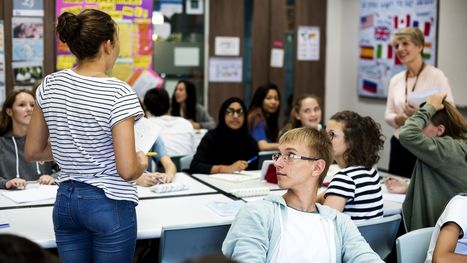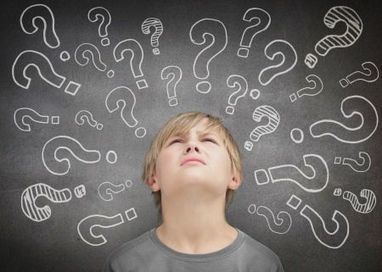When students are provided consistent opportunities to develop and discuss complex questions, they’re empowered with knowledge, curiosity, and intellectual courage. We can make our classrooms places that encourage students to keep asking questions—which are the foundation of learning.
CREATING A CLIMATE FOR QUESTIONING
Modeling questioning strategies that get all students involved allows students to develop confidence in their own ability to craft meaningful questions and share their responses. We also need to establish classroom procedures for respectful dialogue so that students feel safe in sharing their thinking with their peers.
I indirectly model questioning strategies by carefully considering the questions I ask. I set up the year with a few questions that are then discussed throughout the year. Through seminar discussions and reflective writing in the spring, for example, I use questions such as “How does where you live impact how you live?,” “How do humans continue to progress in a diverse world?,” and “How does constructive conversation cultivate empathy and promote participation in local and global communities?” to discuss content as well as to make connections to the world.
Students consider these questions as they participate in the Spotlight Challenge, a design thinking project I created to facilitate opportunities for students to conduct research, craft speeches, and call their peers to action. Consistently making these connections helps create a climate in which students become accustomed to questioning everything.
Learn more / En savoir plus / Mehr erfahren:
https://www.scoop.it/t/21st-century-learning-and-teaching/?&tag=questions
Via Gust MEES



 Your new post is loading...
Your new post is loading...










When students are provided consistent opportunities to develop and discuss complex questions, they’re empowered with knowledge, curiosity, and intellectual courage. We can make our classrooms places that encourage students to keep asking questions—which are the foundation of learning.
CREATING A CLIMATE FOR QUESTIONING
Modeling questioning strategies that get all students involved allows students to develop confidence in their own ability to craft meaningful questions and share their responses. We also need to establish classroom procedures for respectful dialogue so that students feel safe in sharing their thinking with their peers.
I indirectly model questioning strategies by carefully considering the questions I ask. I set up the year with a few questions that are then discussed throughout the year. Through seminar discussions and reflective writing in the spring, for example, I use questions such as “How does where you live impact how you live?,” “How do humans continue to progress in a diverse world?,” and “How does constructive conversation cultivate empathy and promote participation in local and global communities?” to discuss content as well as to make connections to the world.
Students consider these questions as they participate in the Spotlight Challenge, a design thinking project I created to facilitate opportunities for students to conduct research, craft speeches, and call their peers to action. Consistently making these connections helps create a climate in which students become accustomed to questioning everything.
Learn more / En savoir plus / Mehr erfahren:
https://www.scoop.it/t/21st-century-learning-and-teaching/?&tag=questions